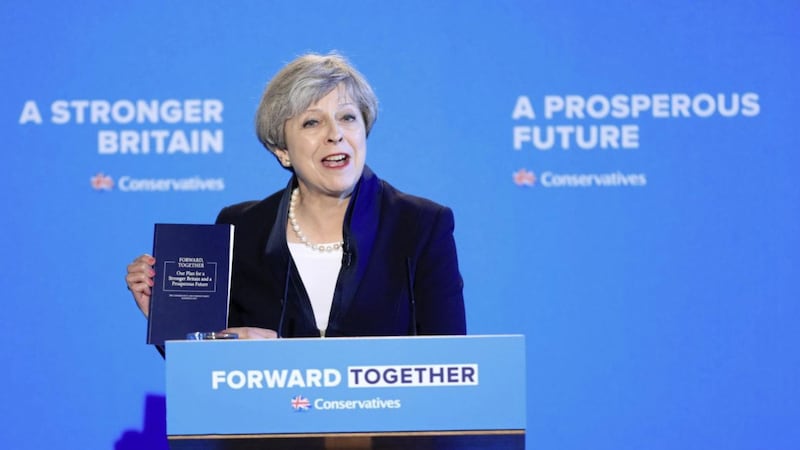"NO Tories. No Border. No Brexit." So declares Sinn Féin's general election slogan, emblazoned on posters, placards and the front page of An Phoblacht.
The ordering of this list is remarkable, even allowing for a century-long grievance against the Conservative Party. It ranks Tories as worse than partition - and better than Brexit for provoking voters to the polls.
The SDLP also treats 'Tory' as a self-explanatory insult. Within nationalism, this presumed loathing is currently serving two important, opposing objectives.
Sinn Féin is using the spectre of Conservative government to agitate for constitutional change, while the SDLP is using it to make a case for restoring Stormont.
But how much of this depends on the mindset of a Troubles generation?
It has been 20 years since Northern Ireland experienced Conservative direct rule. Half the population has no adult memory of it. The early 1980s, which defined modern Irish and Tory hostilities, are ancient history to anyone under 40.
Sinn Féin's leadership in particular is of a Troubles vintage. In most respects the party has been astute in understanding how the past fades and how this allows and requires it to reinvent itself.
Last weekend's march in Belfast for an Irish language act, while not organised by Sinn Féin, showed how perceptions of the party have transformed among many young people, compared to two or three decades ago.
The 1980s adventures of Jeremy Corbyn, currently the focus of some media attention, are deemed an irrelevant distraction by his friends in the republican movement.
Yet when it comes to the Tories, suddenly time stands still and Sinn Féin turns into a Ben Elton tribute act, shouting "Fatcher! Fatcher!" at bemused adolescents.
Even in Northern Ireland - a hereditary political environment - experience shapes opinion and the events of our youth are formative.
For anyone here much under 40, what has actually happened to make pantomime villains of the Tories?
Sinn Féin is using the spectre of Conservative government to agitate for constitutional change, while the SDLP is using it to make a case for restoring Stormont
Full Conservative government only returned to Westminster two years ago.
Those years have been spent obsessing over Brexit, which has proved the Tories never give us a second thought. That might be exasperating but it is hardly a call to the barricades.
Brexit is not the hunger strike - Gerry Adams has openly greeted it as an opportunity.
To a substantial extent, our 21st century experience of Conservative government is only about to begin. It is hard to see how this will greatly antagonise, let alone radicalise, a new nationalist generation.
Theresa May - who coined the phrase "the nasty party" as a warning to her party - will presumably secure a personal mandate next month.
The first effect of this will be to end all parliamentary dependence on the DUP.
The Conservative manifesto pledges to restore Stormont as "strong, stable and inclusive". Bolting that last word onto May's election slogan pointedly squashes any unionist notion of excluding Sinn Féin.
In the meantime, devolution has already been put in a limbo short of direct rule - a fudge that can go on for months.
The manifesto promises a "balanced" approach to Troubles legacy cases but only via full implementation of the Stormont House agreement, rather than through an amnesty for former soldiers and police officers.
On broader issues affecting Northern Ireland, deficit reduction has been kept on the long finger, no further welfare reform is planned and we stand to gain from new regional funding.
In style and tone, May's government is shaping up to be less divisive than her time as Home Secretary suggested. She is using the prospect of a large majority against a far-left opposition to tack to the centre, not to the right.
This week's 'dementia tax' fiasco, like March's national insurance U-turn, reveals a degree of ineptitude and weakness that will make it difficult to portray the Prime Minister as an aggressive ideologue.
Margaret Thatcher destroyed the Tories in Scotland by refusing to cancel a poll tax experiment. May clearly lacks that stubborn conviction.
Of course, even Thatcher was not the Tory of Irish legend.
She reversed the hardline security philosophies brought in under Labour and introduced rolling devolution, then the Anglo-Irish Agreement.
Public spending here never fell. But Thatcher still played to her Iron Lady image, making her an easy hate-figure.
That kind of leadership is not coming back. Nationalists may never love Tory government but being expected to fear and despise it could soon seem over the top.
Especially when an alternative - devolution with a chastened DUP - is so obviously there for the asking.









